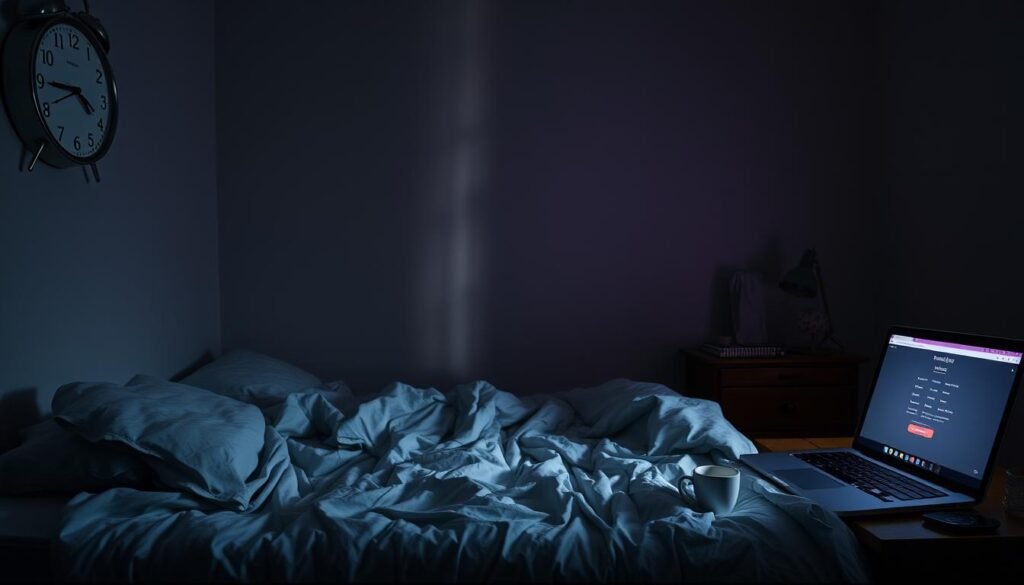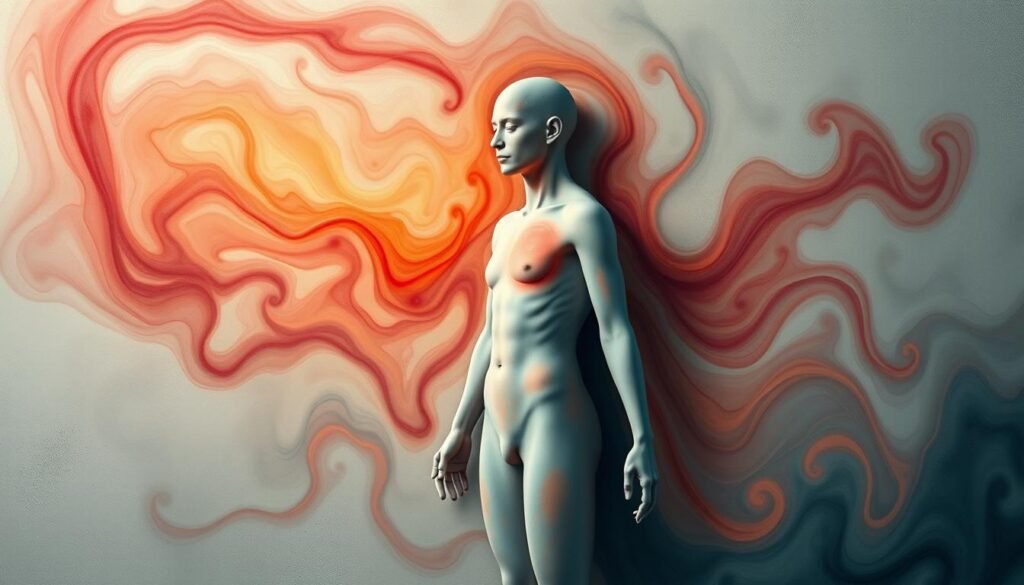Chronic fatigue syndrome impacts about one million Americans. This fact shows how common the problem of body aches and fatigue without fever is. These symptoms can really lower how good someone’s life is. They make people feel tired and weak all the time.
It’s crucial to understand what causes these issues. Often, they come from stress, not drinking enough water, or health problems. This article explores these causes and offers tips on how to handle them. We look at muscle pain, tiredness, and chronic sickness.
Key Takeaways
- Chronic fatigue syndrome affects around one million people in the U.S.
- Stress can manifest physically as muscle pain, contributing to body aches.
- Dehydration is a key factor that can exacerbate fatigue and pain levels.
- Viral infections can lead to significant muscle aches, even in the absence of fever.
- Autoimmune disorders can cause widespread body aches and fatigue.
Understanding Body Aches
Body aches can make your muscles, joints, or bones feel bad. They often come from inflammation or muscle tension. Some people feel sore after exercise, while others have aches from health problems.
Simple things like working too hard or stress can cause aches. It’s important to look at your symptoms closely. Feeling weak, tired, or having chills and a general feeling of discomfort are common too. These signs help us get a full picture of our health.
Knowing more about body aches can help you handle them better. Staying hydrated is key, especially if you’re cramping up. Light workouts, stretching, and heat therapy can ease muscle tension.
Understanding the causes of body aches helps you avoid them. Eating right gives your body the nutrients it needs for healthy joints. If your pain doesn’t go away or gets worse, it’s important to see a doctor. They can figure out the problem and how to treat it.
The Connection Between Fatigue and Body Aches
Fatigue and body aches are closely linked and affect each other in many ways. Feeling tired can make any pain feel worse. This can turn slight discomfort into strong pain. When tired, our bodies may be more sensitive, making aches feel more intense. Often, chronic fatigue comes from various sources, like health issues or lifestyle habits.
About one million Americans have chronic fatigue syndrome. Moreover, diseases like fibromyalgia impact around four million adults, mostly women, causing a lot of pain. Autoimmune diseases such as lupus and multiple sclerosis also lead to aches. These conditions make tackling fatigue complex but important. Knowing how fatigue and aches connect is crucial for improving health.
Addressing fatigue and aches means looking at all possible causes. Lack of vitamins or nutrients like Vitamin D or potassium can make you feel tired and sore. Stress, too, causes body issues like aches or headaches. Understanding the link between these symptoms is key to better health.
| Condition | Impact on Fatigue | Impact on Body Aches |
|---|---|---|
| Chronic Fatigue Syndrome | Affects 1 million Americans | Mild to severe body aches |
| Fibromyalgia | Common cause of chronic fatigue | Affects 4 million adults |
| Lupus | Autoimmune disorder causing fatigue | Joint pain and swelling |
| Vitamin Deficiencies | Promotes feelings of exhaustion | Leads to body aches |
| Chronic Stress | Contributes to fatigue | Results in muscle spasms |
Understanding the link between fatigue and body aches is key. Being proactive can help ease these symptoms. If they get worse or don’t go away, seeing a doctor is vital. Finding out the exact causes can help manage your health better.
Common Causes of Body Aches and Fatigue No Fever
Body aches and fatigue can come from many common causes. Infections like the flu and COVID-19 often cause muscle pain. Even without a fever, these can be the culprits. Chronic issues like fibromyalgia and chronic fatigue syndrome also lead to body aches and tiredness.
Some medications, like statins, may make your muscles hurt. A lack of vitamins, especially vitamin D, might be to blame too. Diseases such as rheumatoid arthritis and Lyme disease can make you feel sore and tired without a fever. It’s key to know the various reasons behind these symptoms.
Stress and lack of water also cause muscle pain. Chronic stress can make our bodies tense without us knowing, causing pain. Not drinking enough water throws off our electrolyte balance, which can lead to cramps. By understanding these common causes, we can find ways to feel better or get the right help.
Checking out information on symptoms of common illnesses in fall and winter is useful. It helps in recognizing what’s causing body aches. Also, learning about natural ways to deal with adrenal shows how managing stress is vital for our health.
Stress as a Contributor to Body Pain
Stress is a big reason behind body pain. It affects both our mind and body. When stressed, our body releases certain hormones, like adrenaline. This leads to tight muscles. Consequently, we feel aching and soreness all over, which is uncomfortable.
Long-term stress can cause many health issues such as weight gain, sleep problems, and gut issues. It can make muscle pain worse and even cause arthritis to flare up. Beyond the physical pain, it also raises the risk of heart disease, high blood pressure, and asthma.

Stress might lead to digestive problems too. Symptoms can include gas, diarrhea, and irritable bowel syndrome. Moreover, people with a lot of stress can get tension headaches and disorders like TMJ. All these symptoms show how stress could be causing our body pain.
Stress can weaken our immune system too. This makes us more likely to get sick or have autoimmune problems. These issues from stress lead to more discomfort and mental strain. To handle stress, relaxation techniques and staying active can help.
It’s important to understand how stress leads to muscle tension and pain. By managing our stress, we can feel better overall. Taking steps to reduce stress can improve our health and happiness.
Dehydration and Its Role in Fatigue
Dehydration greatly affects fatigue and body aches. Our bodies suffer when we lose more fluids than we intake. Symptoms like extreme thirst, dizziness, and dark urine may make us feel more tired.
Dehydration often causes muscle cramping due to not having enough electrolytes. It’s key to realize that even a little dehydration can lead to aches and more tiredness. To stay healthy, it’s crucial to understand this.
- Common symptoms of dehydration include:
- Extreme thirst
- Dark-colored urine
- Fatigue
- Dizziness
- Confusion
People of all ages can face dehydration risks. It’s most risky for babies, older people, and those with ongoing health issues. To avoid these risks, keep up with drinking water especially when sick, in hot weather, or when exercising.
| Age Group | Symptoms | Hydration Strategies |
|---|---|---|
| Infants | Dry mouth, no tears when crying, sunken soft spot | Increase fluid intake through breast milk or formula |
| Older Adults | Extreme thirst, dizziness, fatigue | Encourage regular water intake, monitor urine color |
| Active Individuals | Muscle cramping, fatigue, body aches | Drink fluids before, during, and after exercise |
Knowing about dehydration can help lessen fatigue and aches, boosting well-being. It’s key to often check how much water you drink. Staying aware of hydration signs is vital for a healthy life.
Sleep Deprivation: A Major Factor
A lack of sleep leads to tiredness and body pains. It is key to get seven to eight hours of sleep every night for good health. Not sleeping enough makes people more likely to feel achy.
Sleep deprivation causes more than just tiredness. It can lead to serious issues like obesity, diabetes, and heart diseases.
About 50 to 70 million U.S. adults don’t get enough sleep. This affects how well they think and make decisions. It also weakens the immune system.
Teens need about nine to ten hours of sleep, while younger kids need more. This sleep is vital for their growth and health. Not getting enough sleep makes it harder to get better after being sick.
The Centers for Disease Control and Prevention say nearly one in three adults doesn’t get enough sleep. We need to pay more attention to sleep to improve health.

Viral Infections and Flu-like Symptoms
Viral infections can cause symptoms like fatigue and body aches, even without a fever. These include the flu and common cold. They make your body react with inflammation.
As your body battles the virus, you might feel muscle pain and very tired. This is part of the immune response.
Some common symptoms of viral infections are:
- Fatigue
- Body aches
- Headaches
- Coughing
- Conjunctivitis (in some cases)
Knowing the signs of viral infections helps with quick diagnosis. It’s important to notice changes in your body. Diseases like mono or bronchitis seem similar but differ in length and intensity. Being aware lets you seek the right help for recovery.
| Symptom | Typical Duration | Common Conditions |
|---|---|---|
| Fatigue | Varies | Viral infections |
| Body aches | 1 to 2 weeks | Flu, common cold |
| Headaches | Up to a week | Flu-like infections |
| Conjunctivitis | Variable | Flu, COVID-19 |
Chronic Conditions Leading to Body Aches
Chronic conditions are often behind lingering body aches and tiredness. Fibromyalgia is a key example. It’s marked by pain all over, which varies from person to person. Along with extreme pain sensitivity, stiffness, and tiredness, it greatly affects daily activities.
Those with fibromyalgia usually feel pain from things that shouldn’t hurt, a condition called allodynia. They may also have trouble thinking, get headaches, and suffer from digestive problems like irritable bowel syndrome. Symptoms can change, influenced by stress, how active someone is, and the weather. This makes managing fibromyalgia quite a challenge.
For other chronic issues like arthritis or lupus, inflammation is a big problem causing ongoing pain. Chronic fatigue syndrome (CFS) leads to overwhelming tiredness that rest doesn’t help. Treating these conditions needs a doctor’s help and a plan to handle symptoms.
Here’s a comparison of some chronic conditions often linked to body aches:
| Chronic Condition | Common Symptoms | Treatment Approaches |
|---|---|---|
| Fibromyalgia | Widespread pain, fatigue, cognitive issues, headaches | Physical therapy, medication, lifestyle changes |
| Arthritis | Joint pain, stiffness, swelling | Medications, physical therapy, surgery |
| Lupus | Joint pain, fatigue, skin rashes | Medications, lifestyle adjustments |
| Chronic Fatigue Syndrome | Severe fatigue, sleep issues, muscle pain | Supportive care, lifestyle modifications |

When to Seek Medical Attention
If you’re feeling body aches and tired, watch out for signs that mean you should see a doctor. Sometimes, things get better on their own. But certain symptoms show there might be a big problem.
Symptoms that keep up, especially with lots of pain or hard time breathing, must be checked right away. Important signs are:
- Severe chest pain
- Severe headache
- Shortness of breath
- Dizziness or confusion
- Continuous vomiting
Adults with a fever over 102 degrees and flu symptoms need to see a doctor. Kids are at risk too, especially if their fever goes above 104 degrees or stays for more than three days. Babies younger than 12 weeks with a fever over 100.4 degrees should also see a doctor right away.
A lingering cough for more than two or three weeks could mean bronchitis or asthma. Parents should watch for rapid breathing, being very irritable, or signs of not having enough water in the body. These need quick doctor visits.
The Wesley EmergencyCare Network is open 24/7 for emergencies in many spots. They keep their wait times updated so you can get help fast.
| Symptom | Action |
|---|---|
| Severe chest pain | Seek emergency care |
| Dizziness or confusion | Contact a healthcare provider |
| Cough lasting over 3 weeks | Schedule a doctor’s appointment |
| Fever above 102°F | Seek medical attention |
| Fever in newborns | Visit a doctor immediately |
Conclusion
Body aches and fatigue without fever can stem from many issues, making daily life tough. Lifestyle choices play a big role in fatigue. Busy schedules, not enough exercise, poor diet, and little sleep often cause tiredness. Also, stress, anxiety, depression, and long-term conditions like fibromyalgia or Long COVID can make symptoms worse. Getting the right diagnosis is key to manage these symptoms effectively.
Staying hydrated, managing stress, and getting good sleep are crucial to combat body aches and fatigue. Balanced diets and regular exercise greatly improve well-being. If symptoms keep up, it’s important to see a doctor. They can check out your situation and advise you on the next steps.
Taking care of your health and knowing what causes body aches and fatigue lets you act to get better. Understanding that you might need to try different things helps you make smart choices. This can greatly improve your life quality.